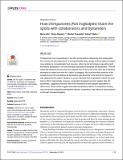Files in this item
How chimpanzees (Pan troglodytes) share the spoils with collaborators and bystanders
Item metadata
| dc.contributor.author | John, Maria | |
| dc.contributor.author | Duguid, Shona | |
| dc.contributor.author | Tomasello, Michael | |
| dc.contributor.author | Melis, Alicia P. | |
| dc.date.accessioned | 2020-01-29T12:30:17Z | |
| dc.date.available | 2020-01-29T12:30:17Z | |
| dc.date.issued | 2019-09-23 | |
| dc.identifier | 265941597 | |
| dc.identifier | 7e635149-af89-4e6d-abbb-e9b9c080ea74 | |
| dc.identifier | 85072564938 | |
| dc.identifier | 31545837 | |
| dc.identifier.citation | John , M , Duguid , S , Tomasello , M & Melis , A P 2019 , ' How chimpanzees (Pan troglodytes) share the spoils with collaborators and bystanders ' , PLoS ONE , vol. 14 , no. 9 , e0222795 . https://doi.org/10.1371/journal.pone.0222795 | en |
| dc.identifier.issn | 1932-6203 | |
| dc.identifier.other | ORCID: /0000-0003-4844-0673/work/67919865 | |
| dc.identifier.uri | https://hdl.handle.net/10023/19375 | |
| dc.description | The study was funded by the Max Planck Society. S. Duguid wrote the manuscript supported by a grant awarded to A. P. Melis from the Templeton World Charity Foundation (TWCF0264). | en |
| dc.description.abstract | Chimpanzees hunt cooperatively in the wild, but the factors influencing food sharing after the hunt are not well understood. In an experimental study, groups of three captive chimpanzees obtained a monopolizable food resource, either via two individuals cooperating (with the third as bystander) or via one individual acting alone alongside two bystanders. The individual that obtained the resource first retained most of the food but the other two individuals attempted to obtain food from the "captor" by begging. We found the main predictor of the overall amount of food obtained by bystanders was proximity to the food at the moment it was obtained by the captor. Whether or not an individual had cooperated to obtain the food had no effect. Interestingly, however, cooperators begged more from captors than did bystanders, suggesting that they were more motivated or had a greater expectation to obtain food. These results suggest that while chimpanzee captors in cooperative hunting may not reward cooperative participation directly, cooperators may influence sharing behavior through increased begging. | |
| dc.format.extent | 12 | |
| dc.format.extent | 750231 | |
| dc.language.iso | eng | |
| dc.relation.ispartof | PLoS ONE | en |
| dc.subject | BF Psychology | en |
| dc.subject | Biochemistry, Genetics and Molecular Biology(all) | en |
| dc.subject | Agricultural and Biological Sciences(all) | en |
| dc.subject | General | en |
| dc.subject | DAS | en |
| dc.subject.lcc | BF | en |
| dc.title | How chimpanzees (Pan troglodytes) share the spoils with collaborators and bystanders | en |
| dc.type | Journal article | en |
| dc.contributor.institution | University of St Andrews. School of Psychology and Neuroscience | en |
| dc.identifier.doi | 10.1371/journal.pone.0222795 | |
| dc.description.status | Peer reviewed | en |
This item appears in the following Collection(s)
Items in the St Andrews Research Repository are protected by copyright, with all rights reserved, unless otherwise indicated.

